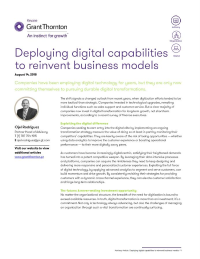-
Financial statements audits
Financial statement audits
-
Compliance audits
Compliance audits
-
Compilations and reviews
Compilations and audit
-
Agreed-upon procedures
Agreed-upon procedures
-
Corporate and business tax
Our trusted teams can prepare corporate tax files and ruling requests, support you with deferrals, accounting procedures and legitimate tax benefits.
-
International tax
Our teams have in-depth knowledge of the relationship between domestic and international tax laws.
-
Tax compliance
Business Tax
-
Individual taxes
Individual taxes
-
Estate and succession planning
Estate and succession planning
-
Global mobility services
Through our global organisation of member firms, we support both companies and individuals, providing insightful solutions to minimise the tax burden for both…
-
Sales and use tax and indirect taxes
SUT/ VAT & indirect taxes
-
Tax incentives program
Tax incentives program
-
Transfer Pricing Study
The laws surrounding transfer pricing are becoming ever more complex, as tax affairs of multinational companies are facing scrutiny from media, regulators and the public

-
Business consulting
Our business consulting services can help you improve your operational performance and productivity,…
-
Forensic and investigative services
At Grant Thornton, we have a wealth of knowledge in forensic services and can support you with issues such as…
-
Fraud and investigations
The commercial landscape is changing fast. An ever more regulated environment means…
-
Dispute resolutions
Our independent experts are experienced in advising on civil and criminal matters involving contract…
-
Business risk services
We can help you identify, understand and manage potential risks to safeguard your business and…
-
Internal audit
We work with our clients to assess their corporate level risk, identify areas of greatest risk and develop…
-
Service organization reports
As a service organization, you know how important it is to produce a report for your customers and their…
-
Transactional advisory services
Transactions are significant events in the life of a business – a successful deal that can have a lasting impact…
-
Mergers and acquisitions
Globalization and company growth ambitions are driving an increase in M&A activity worldwide as…
-
Valuations
We can support you throughout the transaction process – helping achieve the best possible outcome…
-
Recovery and reorganization
We provide a wide range of services to recovery and reorganisation professionals, companies and their…
Companies have been employing digital technology for years, but they are only now committing themselves to pursuing durable digital transformations.
The shift signals a changed outlook from recent years, when digitization efforts tended to be more tactical than strategic. Companies invested in technological upgrades, remaking individual functions such as sales support and customer service. But a clear majority of companies now invest in digital transformation for long-term growth, not short-term improvements, according to a recent survey of finance executives.
Exploiting the digital difference
Companies seeking to earn entry into the digital elite by implementing an ongoing transformation strategy measure the value of doing so at least in part by monitoring their competitors’ capabilities. They are keenly aware of the risk of losing opportunities — whether using data analytics to improve the customer experience or boosting operational performance — to their more digitally savvy peers.
As customers have become increasingly digital-centric, satisfying their heightened demands has turned into a potent competitive weapon. By leveraging their data-intensive processes and platforms, companies can acquire the nimbleness they need to keep designing and delivering more responsive and personalized customer experiences. Exploiting the full force of digital technology, by applying advanced analytics to segment and serve customers, can build momentum and drive growth. By consistently revisiting their strategies for providing customers with a dynamic cross-channel experience, they can elevate customer satisfaction and forge long-term relationships.
The future: A never-ending investment opportunity
No matter the organizational structure, the breadth of the need for digitization is bound to exceed available resources. In truth, digital transformation is more than an investment; it’s a commitment. Not only is technology always advancing, but also the challenges of managing an organization through such a vital transformation are continually surfacing.
Once opportunities are identified, companies need to prioritize them, balancing back-office functions with customer-facing activities. The goal is to keep both ends as aligned as possible, ensuring that the entire customer experience progresses at as even a pace as possible.
In contrast to earlier waves of investment in digital technology, finance executives now understand the advantages that can accrue to a business that looks beyond improving operational performance and reducing costs. Taking the transformation journey requires a company to re-examine every touchpoint it has with customers and suppliers. Knowing where to start means pinpointing which realm of neediness will yield the most visible impact.
Building a culture of digital receptivity
Successfully integrating digital know-how into the organization means making sure that employees fully grasp the vision and possess the necessary capabilities to bring it to fruition.
For some companies, achieving that end may mean recruiting employees who already possess the requisite skills, or hiring executives who can coach current workers in the desired direction. To successfully mold a new business model, companies will need to make sure they have the right materials, including employees who are skilled data scientists, familiar with machine-learning, and adept at data-handling.
Technology will raise the value of skilled employees for the company. Rather than seeing people as costs, management will focus on retaining skilled employees. Technology in its turn, will allow employees to focus on doing tasks they excel at, through which they can create the most value.
Management may have to discard limiting preconceptions that could weigh them down as they strive to heighten the need for transformation. In some cases, that means accepting that digital transformation requires company-wide participation, not just input from the IT function. The pressure to continually adapt, as opposed to adhering to a static plan, must also be reflected in the company’s strategy for succeeding in a turbulent marketplace. To keep innovating, companies need to develop an inquisitive mentality, regularly re-examining their existing route to growth by comparing that strategic map against the real-time data that defines the terrain.
The speed and quality of a company’s data-drenched insights—not to mention how efficiently the organization can incorporate them into their strategy and related operational plans—may be what sustainably sets them apart from their competitors. Advanced analytics can serve as the raw material of innovation, critical to building new features or products. Companies may also find effective sources of differentiation by appropriating services and processes from other industries, using them to serve customers more effectively.
To enable digitization on a transformative scale, organizations must keep internal communication lines open, as cross-functional groups create shared criteria for success and agree on achievable milestones. A digital transformation, after all, is the outcome of many smaller mini-transformations, carefully coordinated and strategically aligned. The absence of such unity can extract a calculable toll.
To prepare their businesses to thrive in a next-generation economy, finance executives will have to direct investments toward digital technologies with capabilities that align with overall strategy and produce the most value. They also face the challenge of integrating digital technology to streamline business processes and enhance the quality of the customer journey. The human component, after all, is what collectively pushes digital transformation beyond the realm of digitizing existing services, and into establishing and sustaining lasting competitive advantage.
This article, which was written by and developed in partnership with CFO Research, the research arm of CFO Publishing.
Source: Grant Thornton library articles
We are committed to keep you updated of all developments that may affect the way you do business in Puerto Rico.

